Contents
Market Overview
Macro Review
From U.S. inflation concerns to Chinese growth woes; China’s growth concerns dominated headlines over the past week, and began with a 100bp unwind of the RRR that it raised only in December. China’s growth forecast for 2Q has also been cut 30bp to 4.3% given its pursuit of zero COVID. The impact in CNH is more obvious, but Chinese equities and credit also underperformed. Further pressure came with the DXY breaking to a fresh five-year high, where EMFX and AUD were left absorbing most of the shock. The extent of CNH being deflationary will soon become a key debate but we concede that it is a premature topic. Meanwhile, the Bank of Japan maintained its policy stance (yield curve control) and forward guidance. As such, it will continue to buy JGBs and stop the 10-year note rising above 25bp. They also revised 2022 core CPI to 1.9% from 1.1% but kept 2023 inflation unchanged at 1.1%. The bizarrely loose policy catapulted JPY above 130 and triggered the DXY move, but in turn EUR is headed to parity while GBP traded down to a low of 1.24. Then, AUD had a brief moment of strength even if short-lived, which was a consequence of ‘red hot’ inflation that was 50bp above expectations at 5.1% and re-priced OIS markets. The RBA is now expected to carry out its first hike on Tuesday. The next bout of volatility was in the Nasdaq where the drawdown from the previous high in November exceeded -20% for only a third time in the past decade. The tech-led sell-off triggered further volatility in the Korean won and Israeli shekel. If that wasn’t enough, U.S. growth in 1Q unexpectedly slipped into negative territory. A decline in U.S. GDP of 1.4% was certainly a surprise but the sell-side have not rushed to fear a looming technical recession (at least not in 2022). Ultimately, these events are unlikely to lead to any rethinking of policy normalization at the Federal Reserve as a 50bp hike is an important next step to at least maintaining some credibility. However, the topic of inflation in EM was ever pressing. Peru’s President Castillo continued to push for a social market economy, along with constitutional reform, although anti-inflation protests remain the main theme that led to some weakness in asset markets. Mexico has taken this one step further and remains the first EM country to react to inflation with a ‘price pact’. Meanwhile, Russia’s war escalated to another level with military action in Moldova’s breakaway republic of Transnistria, on the same day that Russia turned off the gas taps to Poland and Bulgaria. Yet perhaps the largest surprise of the week was Russia’s decision to pay the principal on the 2022 and coupon on the 2042 Eurobonds. Proceeds are currently with the paying agent (Citibank) as the intermediary who would then distribute proceeds to investors. While it is likely that Russia now avoids default, there is a possibility that the paying agent could withhold funds from investors which is principally why EuroChem defaulted.
EM Credit Update
Emerging market sovereign credit ended the week down 0.7% with spreads 19bp wider. Outperformers over the week were El Salvador, Pakistan and Tajikistan, while Ukraine, Ghana and Nigeria underperformed. We would add that the almost 7% depreciation in BRL over the past week did little to trigger any sell-off in Brazilian dollar bonds. In fact, only FX-hedged Brazilian local returns were down 5%, while unhedged returns were actually positive and up 40bp. As such, the spike in G10 at-the-money one-month volatility, which has triggered weakness in EMFX, caused almost no major weakness in EM credit.
The Week Ahead
Fedspeak ahead of the FOMC blackout period signaled that a 50bps rate hike is in the cards at the May meeting. The Bank of England and Reserve Bank of Australia meetings will also be in focus. Then China’s FX reserves are back in focus, although the chaos in global currency markets will likely thrust CNH into view again given the significant weakness of late. The theme of COVID lockdowns returned and Hong Kong will be out with 1Q economic activity, which is likely to bake in some of the weakness associated with the fifth wave. Interest rates decisions due out of Brazil (11.75%), Czech Republic (5.0%) and Poland (4.5%). Finally, we can expect inflation readings out of Chile, Colombia, Peru, Philippines, South Korea, Thailand and Turkey. The latter could post a figure that is greater than 70% for April after a 61.1% rise in March.
Highlights from emerging markets discussed below include: China lowers FX deposit RRR and announces infrastructure investment push to manage growth and FX outlook; President Erdogan’s reset with Saudi Arabia driven by need to secure external financing for FX stability and growth in the run-up to presidential elections; and Global emerging markets corporates in focus: Call me…maybe
Fixed Income
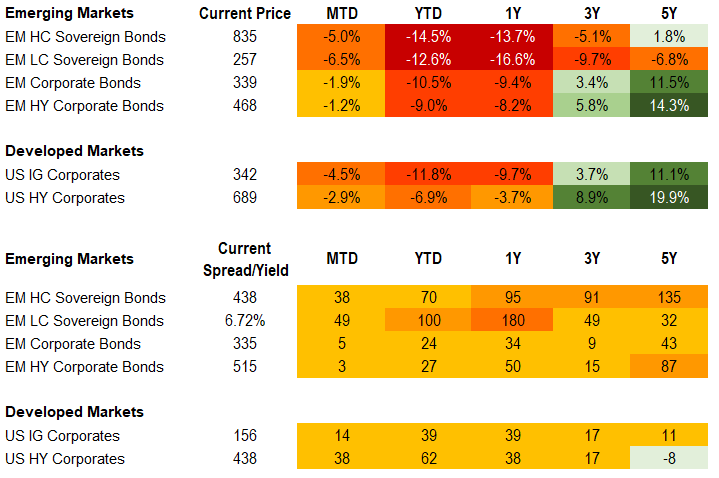
Equities
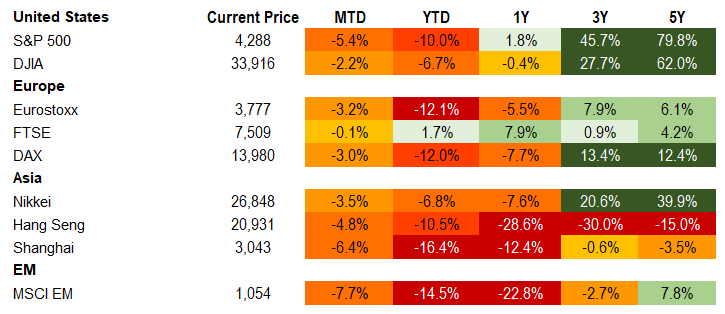
Commodities

Source for data tables: Bloomberg, JPMorgan, Gramercy. EM Fixed Income is represented by the following JPMorgan Indicies: EMBI Global, GBI-EM Global Diversified, CEMBI Broad Diversified and CEMBI Broad High Yield. DM Fixed Income is represented by the JPMorgan JULI Total Return Index and Domestic High Yield Index. Fixed Income, Equity and Commodity data is as of April 29, 2022 (mid-afternoon).
Emerging Markets Weekly Highlights
China lowers FX deposit RRR and announces infrastructure investment push to manage growth and FX outlook
Event: On Monday, the PBOC cut the FX deposit reserve requirement ratio 100bps to 8%, injecting an estimated $7bn in USD liquidity. This followed a roughly 3% renminbi depreciation the week prior. CNY continued to weaken throughout the week reaching 6.6 renminbi per USD. Meanwhile, amid ongoing lockdowns and stalling growth, the Central Financial and Economic Affairs Commission, China’s highest economic policy body and chaired by President Xi, called for “comprehensively advancing infrastructure investment”.
Gramercy Commentary: We see the authorities’ actions as an attempt to limit downside pressures in the backdrop of sustained near-term commitment to its zero-Covid strategy. This is in line with our expectation that the government would react to economic weakness with policy, although it will remain constrained by financial stability concerns and a policy loosening stance amid a global backdrop of tightening. While infrastructure was already part of the growth narrative for 2022 with a pick-up and front-loading of local government issuance, the latest plan appears to envisage loosening of project approvals to increase momentum with a targeted approach in areas of energy security, digitization, major city transportation, water conservancy, and rural infrastructure. We foresee 2022 growth to be around 4.5%, below the government’s target of 5.5%, and in part dependent on pace and scope of the latest infrastructure push as well as COVID policy as the year progresses. The FX deposit cut serves mostly as a signal given liquidity impact is limited. The outlook for the FX rate in the near-term will depend on a mix of capital flows, the trade balance amid softening external demand, and scope of indirect or direct intervention.
President Erdogan’s reset with Saudi Arabia driven by need to secure external financing for FX stability and growth in the run-up to presidential elections
Event: Turkish President Recep Tayyip Erdogan visited Saudi Arabia this week to meet Crown Prince Mohammed Bin Salman, other dignitaries, and to visit Mecca.
Gramercy commentary: Relations between Turkey and Saudi Arabia have been severely strained since Ankara exposed the murder of Saudi dissident Jamal Khashoggi at the kingdom’s Istanbul Consulate in 2018. However, Turkey recently dropped the judicial proceedings related to the case and transferred it to Saudi Arabia, sending a clear signal that it is eying a reset of bilateral relations. Ankara’s rapprochement toward Riyadh is one of several geopolitical “charm offensives” that President Erdogan has embarked on in an attempt to improve relations with regional and global powers. Turkey is highly dependent on external financing and a potential currency swap arrangement with Saudi Arabia, similar to existing facilities worth $28bn with China, Qatar, South Korea and the United Arab Emirates, could provide a welcome short-term boost to CBRT’s depleted foreign reserves. Securing fresh FX liquidity bilateral sources could support the Turkish economy’s ability to muddle through until elections in June 2023 (or earlier if snap elections are called) with relative TRY stability. The muddle-through scenario has been complicated by likely much lower-than-expected tourism revenues this summer season, higher energy prices, and significantly widening Current Account deficit, due to various spillover effects from the war in Ukraine. We expect President Erdogan’s diplomatic “charm offensives” to intensify in the coming months, including in relation to the U.S. and EU, while also trying to preserve his good relationship with the Kremlin. This is a very delicate, challenging, and important balancing act, especially as the Turkish economy increasingly feels the negative impact of a likely protracted conflict in Ukraine.
Global emerging markets corporates in focus: Call me…maybe
Event: Garanti BBVA chose to skip the once-only call on a USD750mm Tier 2 instrument with a final maturity in May 2027. A combination of reasons was given for this including global risks and uncertainties and an economic call policy. This decision was taken even though Garanti BBVA disclosed excess capital of TRY21bn at end March 2022 and the issuer’s foreign currency liquidity buffer exceeds total external debt. Developments at Garanti BBVA have prompted yet another look at near-term calls on subordinated instruments issued by financial institutions.
Gramercy commentary: It would be difficult to replicate the market impact which a similar, now infamous decision by Deutsche Bank had many years ago. However, the drop in the price of the Garanti BBVA Tier 2 bond suggests the issuer was expected to exercise the call option. Garanti BBVA has bought back senior instruments in the past and will begin to lose capital credit on the Tier 2 instrument from this year, at a rate of 20% per year. In addition, it is noteworthy that both Akbank and TSKB have called Tier 2 instruments this year. In the context of other Turkish banks’ calls, it may be tricky to argue that the decision at Garanti BBVA was driven by Turkey’s banking regulator. Nonetheless, some may highlight that Akbank had replaced the instrument which was called (with a 2031 Tier 2) and TSKB received a boost to additional Tier 1, capital but Garanti BBVA has been absent from the USD Eurobond market since 2017. Considering call options on securities issued by financial institutions outside Turkey, the experience so far this year has been mixed. While Woori Bank recently exercised a call on a perpetual security, GNB Sudameris decided against this for a USD300mm Tier 2. This somewhat checkered call history suggests that it’s best to assess call dates on an issuer-by-issuer basis. Having said this, a quick look at the prices of USD-denominated financial institutions’ subordinated bonds callable between now and end-2023 suggests that for the most part, the market still expects calls to be exercised. The risk, therefore, is that other issuers may choose to skip calls. Importantly, such decisions do not preclude buybacks, exchange offers or other forms of liability management prior to the final maturity dates. There may be other ways for issuers to redeem their bonds – and themselves.
Emerging Markets Technicals
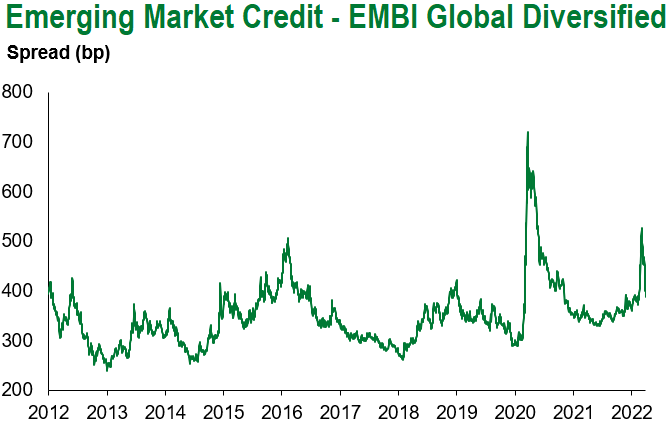
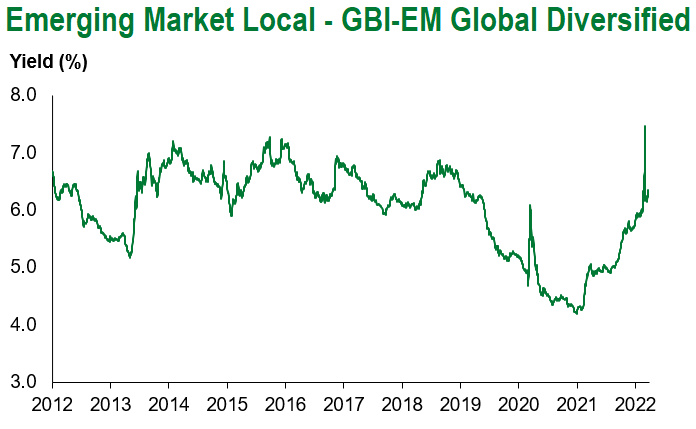
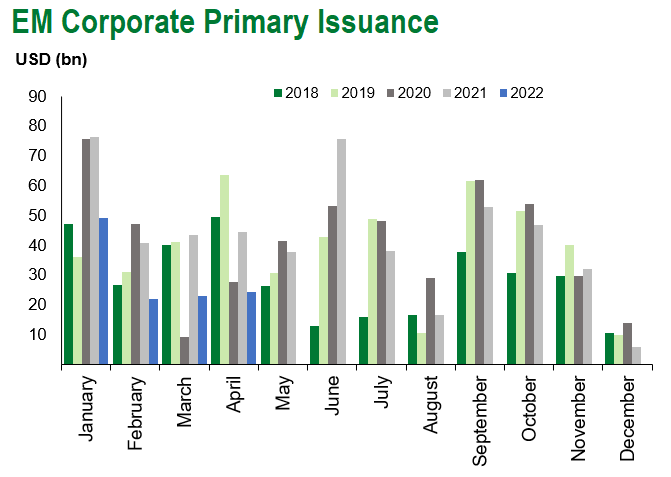
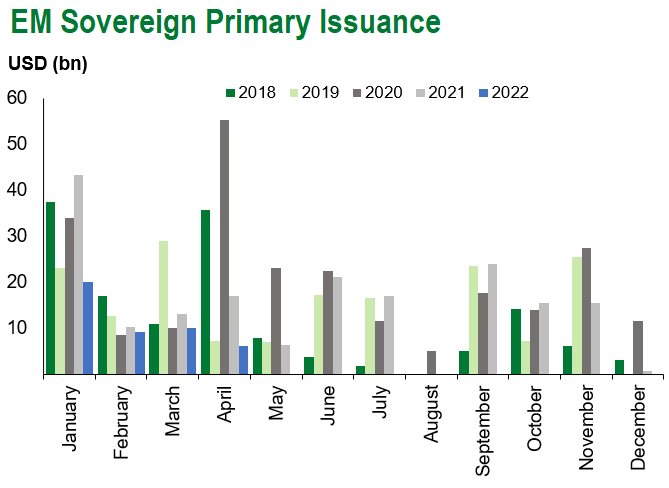
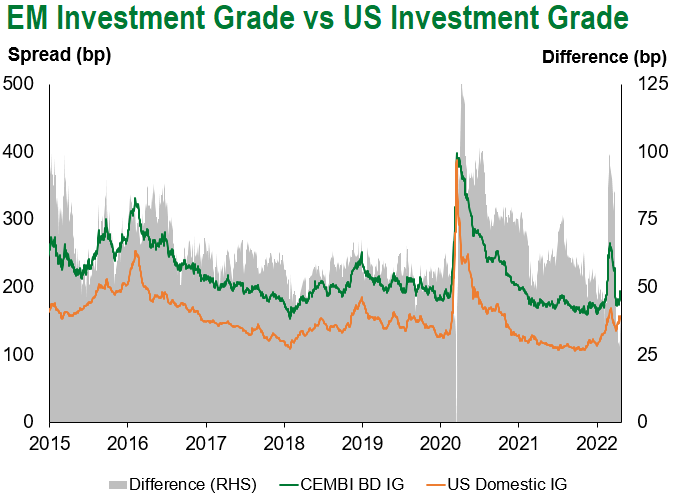
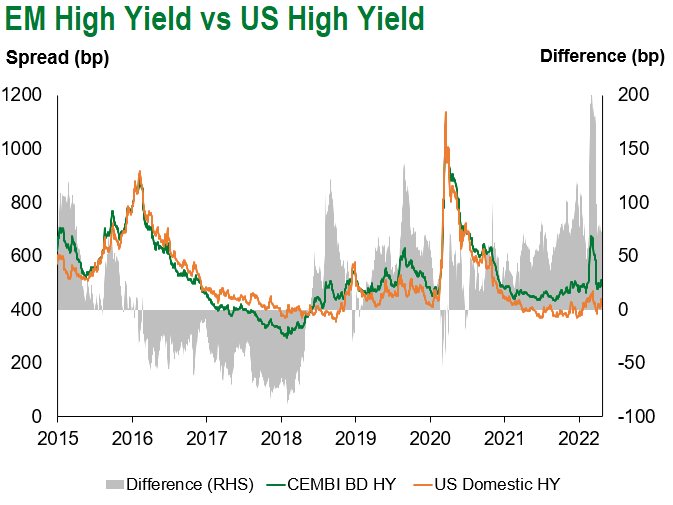
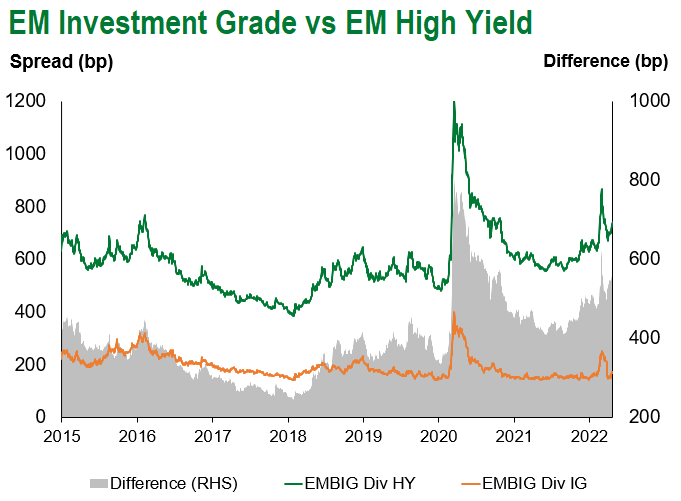
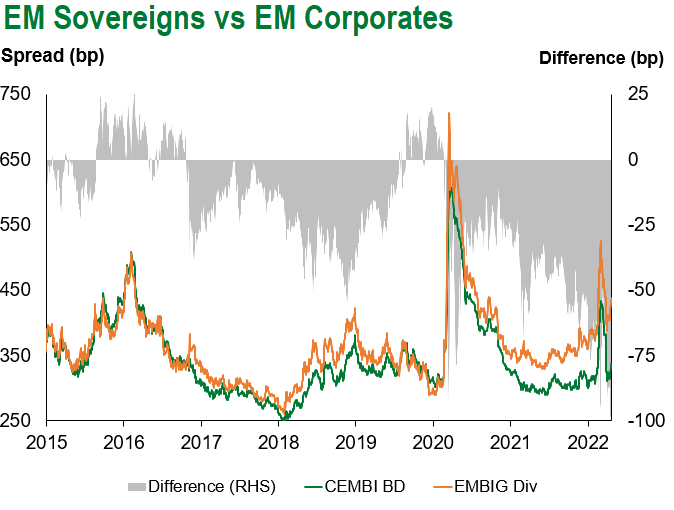
Emerging Markets Flows
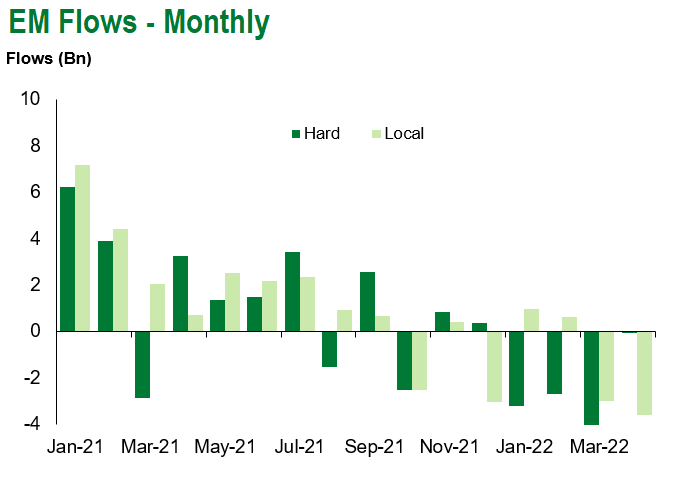
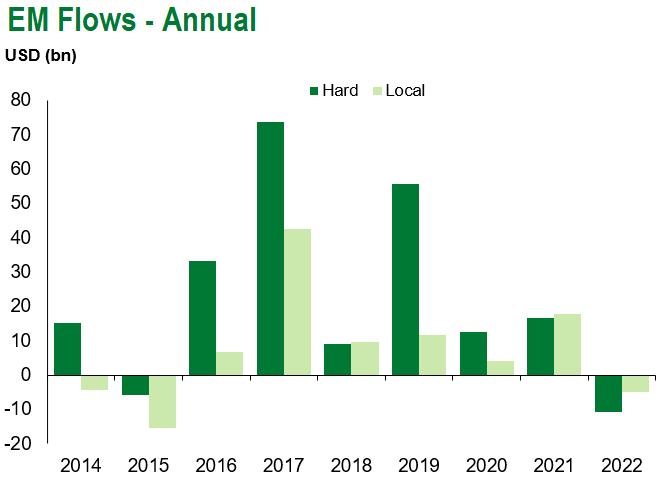
Source for graphs: Bloomberg, JPMorgan, Gramercy. As of April 29, 2022.
COVID Resources
Emerging Markets COVID-19 Case Summary
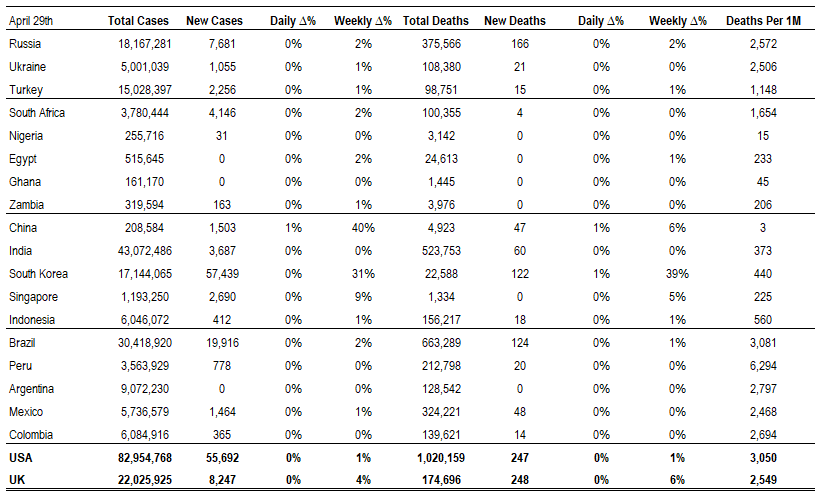
Source: Worldometer as of April 29, 2022.
Additional Crisis Resources:
Johns Hopkins COVID-19 Case Tracker
For questions, please contact:
Kathryn Exum, CFA ESG, Director, Co-Head of Sovereign Research, [email protected]
Petar Atanasov, Director, Co-Head of Sovereign Research, [email protected]
James Barry, Director, Deputy Portfolio Manager, [email protected]
Tolu Alamutu, CFA, Director, Corporate Research Analyst, [email protected]
This document is for informational purposes only. The information presented is not intended to be relied upon as a forecast, research or investment advice, and is not a recommendation, offer or solicitation to buy or sell any securities or to adopt any investment strategy. Gramercy may have current investment positions in the securities or sovereigns mentioned above. The information and opinions contained in this paper are as of the date of initial publication, derived from proprietary and nonproprietary sources deemed by Gramercy to be reliable, are not necessarily all-inclusive and are not guaranteed as to accuracy. This paper may contain “forward-looking” information that is not purely historical in nature. Such information may include, among other things, projections and forecasts. There is no guarantee that any forecasts made will come to pass. Reliance upon information in this paper is at the sole discretion of the reader. You should not rely on this presentation as the basis upon which to make an investment decision. Investment involves risk. There can be no assurance that investment objectives will be achieved. Investors must be prepared to bear the risk of a total loss of their investment. These risks are often heightened for investments in emerging/developing markets or smaller capital markets. International investing involves risks, including risks related to foreign currency, limited liquidity, less government regulation, and the possibility of substantial volatility due to adverse political, economic or other developments. The information provided herein is neither tax nor legal advice. Investors should speak to their tax professional for specific information regarding their tax situation.